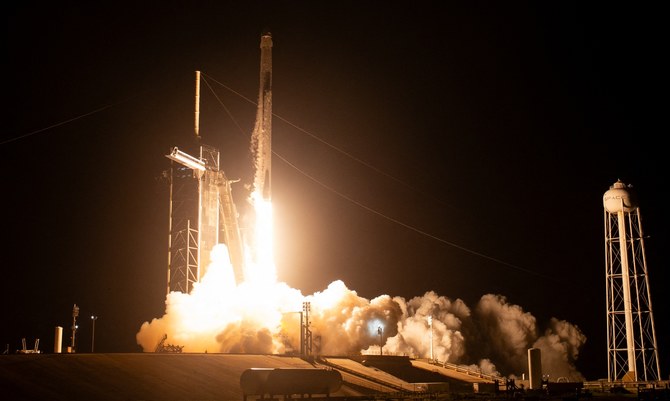
- ARAB NEWS
- 18 Jul 2025

There is no doubt that Elon Musk has, with SpaceX, transformed the space landscape. There is also no doubt that this was possible thanks to a new approach by NASA and other US institutions. SpaceX has pioneered the use of private, reusable rockets to service America’s space program and more. In short, NASA, instead of using its own rockets, decided to outsource its supply missions to the International Space Station and the launch of satellites into orbit.
This venture marked a break with tradition. NASA engaged entrepreneurs in a way that allowed it to satisfy its needs and let commercial industry gain a foothold. It has had a profound impact on the way NASA does business and the space industry as a whole. It unleashed the age of commercialized space. This is why there is today a vibrant landscape of space companies on both sides of the Atlantic that is empowering an age of innovation and competition.
As greater payload capacity was developed, this reduced costs and also allowed for new businesses such as Starlink. For those who do not know, SpaceX’s Starlink uses satellites to provide internet services. By reading the description on their website, it is clear that neither the company nor its founder, Elon Musk, anticipated being drawn into the Ukraine conflict. Starlink describes itself as the world’s first and largest satellite constellation. It uses a low Earth orbit to deliver broadband internet that is capable of supporting streaming, online gaming, video calls and more.
As the conflict with Russia has devastated Ukraine’s infrastructure, Starlink terminals have proved to be essential for preserving internet connectivity and communication in the country. It has also been used by the Ukrainian army in its activities. Thousands of Starlink terminals have been delivered to Ukraine by SpaceX since February last year. Last week, it was claimed that Musk temporarily blocked the service last September as the Ukrainian military launched a surprise attack on Russian forces in Crimea. In response, Musk stated on X, formerly known as Twitter, that SpaceX “did not deactivate anything” because it was never activated in certain places to begin with. He clarified: “There was an emergency request from government authorities to activate Starlink all the way to Sevastopol.” And added: “If I had agreed to their request, then SpaceX would be explicitly complicit in a major act of war and conflict escalation.”
There is a vibrant landscape of space companies that is empowering an age of innovation and competition
Khaled Abou Zahr
This situation illustrates how technology from commercial and private space companies, even in telecommunications, can have dual-use capabilities. This means that this technology can give clear advantages to the country that possesses it and hence there is sensitivity around it. This also shows that, in this new era, private companies are faced with decisions that never existed in the past, putting the large ones in a sovereign playground. This also applies to the large social media platforms when it comes to information or disinformation campaigns.
More importantly, this indicates the absolute need for any country to protect its infrastructure and supply chains and for it to be able to maintain its own sovereign access to space and to satellites. When looking at the importance of satellites and the use of GPS, for example, an attack on such assets would automatically prevent most apps from functioning, as well as affecting the financial system.
To present this as a sovereign issue, Europe is currently without a rocket to use for launches. This has grave implications. Indeed, will the Galileo global satellite navigation system be dependent on the goodwill of the US to remain in service beyond 2024? Thierry Breton, the European commissioner in charge of EU space policy, will have to decide this autumn: choose SpaceX for a 2024 launch or wait for an Ariane 6 flight in 2025. French media outlets have described this as one of the most explosive and complicated issues Breton has to deal with.
Technology from commercial and private space companies, even in telecommunications, can have dual-use capabilities
Khaled Abou Zahr
Galileo and the Copernicus Earth observation program are flagships of the EU’s space policy. They provide valuable services that enable more accurate navigation and timing, as well as delivering valuable data about the Earth. However, if Europe lacks space access, it puts the entire continent in a precarious position. Even among friends, this poses a dilemma. Satellites are also used for intelligence purposes and for the protection of nations. So, being dependent on another country presents a vulnerability. But should it?
Launches into space are such a difficult task that there should be broad collaboration between partners and friends. Let us not forget that, before NASA shifted its working model and SpaceX became operational, it had to rely on Russian Soyuz rockets after abandoning its own launches in 2011. Last year, despite the conflict in Ukraine, NASA and Russia’s space agency Roscosmos signed a long-sought-after agreement to integrate flights to the International Space Station. This allows Russian cosmonauts to fly on US-made spacecraft in exchange for American astronauts being able to ride on Russia’s Soyuz.
As we say in Arabic, sometimes you hate something, and it is good for you. Maybe Musk’s actions served Ukrainians more than they think. And the same could apply to international collaboration, as it avoids isolated and dangerous decisions. In the realm of space, it should be about partnerships and collaboration among friends.